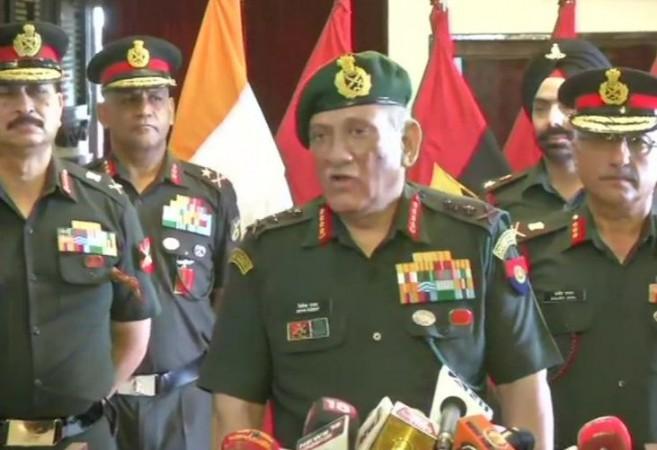
Indian Army chief General Bipin Rawat said on Monday, September 23, that the Jaish-e-Mohammed (JeM) terror camp in Balakot has been revived months after it was bombed by the Indian Air Force.
"Balakot has been re-activated by Pakistan, very recently. This shows Balakot was affected, it was damaged; it highlights some action was taken by the Indian Air Force at Balakot and now they have got the people back there," Rawat said at the Officers Training Academy (OTA) in Chennai.
He stated that "at least 500 infiltrators" were waiting to infiltrate into India and the figures keep varying.
"Pakistan violates ceasefire to push terrorists into our territory. We know how to deal with ceasefire violations. Our troops know how to position themselves and take action. We are alert and will ensure that maximum infiltration bids are foiled," said the army chief.
Rawat further added that the Indian Army was ready for the challenge and indicated that the response this time would be "beyond" the Balakot airstrike. When asked if India's reaction would be similar to the Balakot retaliation, he said: "Why repeat? Why not beyond that? Let them keep guessing."
The development came after the Indian government's move to abrogate the special status granted to Jammu and Kashmir through Article 370. Pakistan has on various instances condemned the move and has repeatedly tried to internationalise the issue.
The army chief said that terrorists were trying to build an image of the Valley under a clampdown, but normal activities are being carried out in Kashmir. "There is a communication breakdown between terrorists in the Kashmir Valley and their handlers in Pakistan but there is no communication breakdown between people to people," said Rawat.
The Indian Air Force fighters in February had flown deep into Pakistan and bombed the Markaz Syed Ahmad Shaheed facility at Balakot in Manshera, Khyber Pakhtunkhwa province, in response to the February 14 suicide car bombing in J&K's Pulwama, claiming the lives of 40 CRPF jawans.
Revival of the terror camps in Pakistan goes against the country's commitment to the international community on not giving shelter to terrorists.
Pakistan was blacklisted by terror watchdog Financial Action Task Force's (FATF) Asia Pacific Group (APG) in August for its failure to meet global standards. The country was found non-compliant on 32 of the 40 parameters on money-laundering and terror financing.
Pakistan Prime Minister Imran Khan had accused India of lobbying to get it blacklisted. "We tried really hard to normalise ties with India. But they [India] exploited the situation. They exploited the Pulwama [attack] for their elections. They have been lobbying to get us blacklisted by the FATF (Financial Action Task Force] as well," Imran Khan had said.
The country had earlier reportedly shut down 13 training camps run by militant organisations Jaish-e- Mohammed, Lashkar-e-Taiba and Hizbul Mujahideen in various parts of Pakistan occupied Kashmir (PoK), to avoid being blacklisted by FATF.











